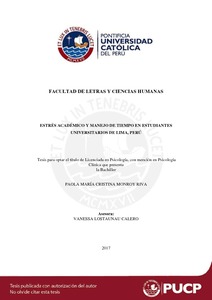| dc.contributor.advisor | Lostaunau Calero, Ana Vanessa | |
| dc.contributor.author | Monroy Riva, Paola María Cristina | |
| dc.date.accessioned | 2018-01-24T16:26:30Z | es_ES |
| dc.date.available | 2018-01-24T16:26:30Z | es_ES |
| dc.date.created | 2017 | es_ES |
| dc.date.issued | 2018-01-24 | es_ES |
| dc.identifier.uri | http://hdl.handle.net/20.500.12404/9938 | |
| dc.description.abstract | En la presente investigación se tuvo como objetivo principal el relacionar y
describir la relación entre el estrés académico y el manejo de tiempo de un grupo de
estudiantes universitarios que cursan los primeros ciclos de facultad. Como instrumentos, se
utilizó el Inventario SISCO del estrés académico (Barraza, 2007) y la versión en español de la
Escala de Manejo de Tiempo (TMBQ, García-Ros y Pérez-González, 2012). Tras la
aplicación, se realizaron los análisis estadísticos pertinentes. Comenzando con la relación
entre ambas variables, establecimiento de objetivos y prioridades correlaciona de manera
positiva con afrontamiento y negativamente con reacciones psicológicas y comportamentales.
Comportamiento similar se encontró con percepción de control de tiempo. Preferencias por la
desorganización tiene relación negativa tanto en afrontamiento como los tres tipos de
reacciones. Finalmente, se encontraron diferencias significativas en cuanto a sexo,
repitencias, percepción de rendimiento, cantidad de horas de estudios y presencia de
enfermedades, tanto físicas como mentales. | es_ES |
| dc.description.abstract | The present investigation had as main objective to relate and describe the levels of
academic stress and time management of a group of university students in the first cycles of
faculty. As instruments, the inventory of academic stress SISCO (Barraza , 2007) and the
Spanish version of the Time Management Scale (TMBQ , García -Ros and Perez - Gonzalez,
2012) were used. Following the application, the relevant statistical analyzes were performed.
Beginning with the relationship between both variables, setting goals and priorities correlates
positively with coping and negatively with psychological and behavioral reactions. Similar
behavior was found with time control perception. Preferences for disorganization have
negative relationship both in coping and the three types of reactions. Finally, significant
differences were found in terms of gender, repetition, perception of performance, number of
hours of studying and presence of physical and mental diseases. | es_ES |
| dc.language.iso | spa | es_ES |
| dc.publisher | Pontificia Universidad Católica del Perú | es_ES |
| dc.rights | Atribución-NoComercial-SinDerivadas 2.5 Perú | * |
| dc.rights | info:eu-repo/semantics/openAccess | es_ES |
| dc.rights.uri | http://creativecommons.org/licenses/by-nc-nd/2.5/pe/ | * |
| dc.subject | Stress (Psicología) | es_ES |
| dc.subject | Administración del tiempo | es_ES |
| dc.subject | Estudiantes universitarios--Investigaciones | es_ES |
| dc.title | Estrés académico y manejo de tiempo en estudiantes universitarios de Lima, Perú | es_ES |
| dc.type | info:eu-repo/semantics/bachelorThesis | es_ES |
| thesis.degree.name | Licenciado en Psicología Clínica | es_ES |
| thesis.degree.level | Título Profesional | es_ES |
| thesis.degree.grantor | Pontificia Universidad Católica del Perú. Facultad de Letras y Ciencias Humanas | es_ES |
| thesis.degree.discipline | Psicología Clínica | es_ES |
| renati.discipline | 313026 | es_ES |
| renati.level | https://purl.org/pe-repo/renati/level#tituloProfesional | es_ES |
| renati.type | http://purl.org/pe-repo/renati/type#tesis | es_ES |
| dc.publisher.country | PE | es_ES |
| dc.subject.ocde | https://purl.org/pe-repo/ocde/ford#5.01.00 | es_ES |






